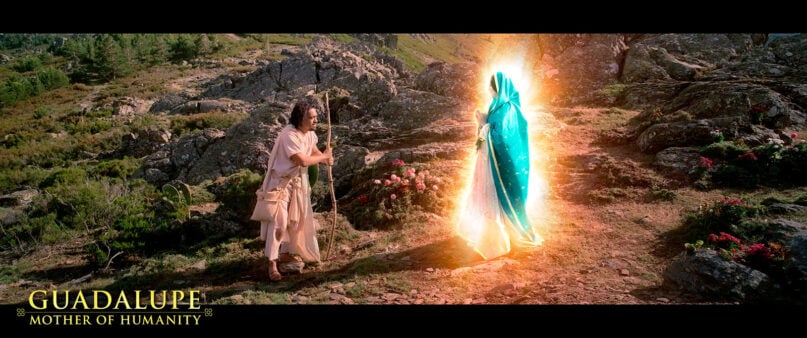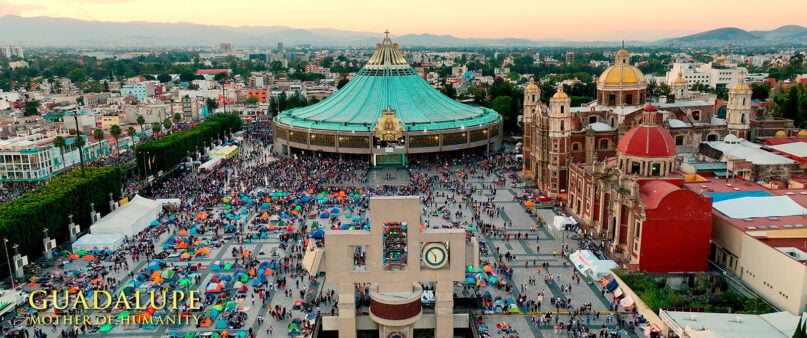
Actor Mario Alberto Hernandez as Juan Diego, left, and Angelica Chong as the Virgin of Guadalupe in a dramatized scene from “Guadalupe: Mother of Humanity.” (RNS/Courtesy of Goya Producciones)
A new documentary about the Virgin of Guadalupe — the vision of Mary, the mother of Jesus, seen by a 16th-century Mexican peasant — premiered Tuesday (Feb. 13) at an event in Los Angeles attended by the city’s archbishop.
"Guadalupe: Madre de la Humanidad" ("Guadalupe: Mother of Humanity"), in Spanish with English subtitles, will run in more than 100 Regal and Cinemark theaters across the U.S. from Feb. 22 to Feb. 28. The film, by the Spanish company Goya Producciones, features dramatized scenes of Our Lady of Guadalupe’s apparitions and interviews with those impacted by her, including LA Archbishop José Gomez.
The film will also be released in hundreds of theaters in Latin America and Spain.
Narrated by Pepe Alonso, a presenter on the Eternal Word Television Network, the documentary stars Mexican actors Karyme Lozano, known for lead roles in many telenovelas, as the hostess, Angelica Chong as the Virgin of Guadalupe and Mario Alberto Hernandez as the man who saw the virgin, Juan Diego.
The filmmakers collected testimonies about the Virgin of Guadalupe’s miracles in the U.S. and Mexico, as well as Germany, a nod to the documentary’s title acknowledging Our Lady of Guadalupe’s impact far from Tepeyac Hill in Mexico, where the apparition occurred.
Our Lady of Guadalupe, the patron saint of Mexico, appeared to St. Juan Diego, an Indigenous convert to Catholicism, in December of 1531.
When the bishop did not believe Juan Diego’s account that Mary had requested a shrine be built on Tepeyac Hill, she appeared a second time to Juan Diego and ordered him to collect roses. As Juan Diego opened his cloak in the bishop’s presence to reveal the roses, the now-famous brown-skinned image of Our Lady of Guadalupe was displayed on his cloak.
According to Goya Producciones, the company’s previous feature film, "A Father’s Heart" ("Corazón de Padre"), was seen by 220,000 people worldwide, including more than 40,000 viewers in the U.S. over two days.

Pilgrims gather outside the Basilica of Guadalupe on her feast day in Mexico City in a scene from “Guadalupe: Mother of Humanity.” (Image courtesy of Goya Producciones)
Andrés Garrigó, a former journalist, was inspired to found the Spanish company Goya Producciones more than two decades ago after meeting EWTN founder Mother Mary Angelica of the Annunciation, a Poor Clares of Perpetual Adoration sister, who, he said, "seemed like a saint" to him.
Because there were already many documentaries telling the story of Our Lady of Guadalupe, Garrigó never expected Goya Producciones to make one, he said, but he finally responded to the many requests he got, including from Mexicans.
He said the film dramatizes life in Mexico before the Spanish arrived to illustrate Our Lady of Guadalupe’s impact. Garrigó said that Jesus’ sacrifice on the cross "abolishes completely the human sacrifices of the Indians, the Aztecs and other pre-Hispanic tribes that killed thousands and thousands of people."
"In that period, the devil was very active," Garrigó said.
Advertisement
When asked whether the film would depict Spanish colonial violence, Garrigó disputed that violence and referred to the Black Legend — the idea that anti-Spanish and anti-Catholic prejudice has shaped histories of colonial Mexico, including accounts of the Dominican missionary the Rev. Bartolomé de las Casas.
Pope Francis, the first Latin American pope, has frequently spoken about the violent history of colonialism and the church’s role in it.
"Many grave sins were committed against the native peoples of America in the name of God," Francis said during a speech in Santa Cruz, Bolivia, in 2015.








